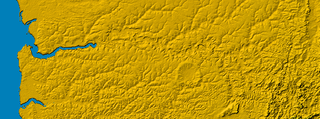
Kolda is a city located in southern Senegal. It is the capital city of Kolda Region and Kolda Department, a region known historically and popularly as Haute Casamance.

Vélingara is a town located in the Kolda Region of Senegal. It is slightly north of the large 48 km Vélingara crater though the structure's impact origin is still unconfirmed.

Islam is the predominant religion in Senegal. 97 percent of the country's population is estimated to be Muslim. Islam has had a presence in Senegal since the 11th century. Sufi brotherhoods expanded with French colonization, as people turned to religious authority rather than the colonial administration. The main Sufi orders are the Tijaniyyah, the Muridiyyah or Mourides, and to a lesser extent, the pan-Islamic Qadiriyyah and the smaller Layene order. Approximately 1% are Shiites.

Vélingara Department is one of the 46 departments of Senegal, one of the three making up the Kolda Region in the Upper Casamance.
Shia Islam in Africa is the continent's second most widely professed sect of Islam behind Sunni Islam.

There are various ethnic groups in Senegal, The Wolof according to CIA statistics are the majority ethnic group in Senegal. Many subgroups of those can be further distinguished, based on religion, location and language. According to one 2005 estimate, there are at least twenty distinguishable groups of largely varying size.
Bonconto Arrondissement is an arrondissement of the Vélingara Department in the Kolda Region of Senegal. It is also spelled Bonkonto.
There is a significant community of Lebanese people in Senegal.
Religion and beliefs occupy an important place in the daily life of the nation of Senegal. The majority of citizens follow Islam. In 2013, 6% of the population followed indigenous beliefs, while 2% followed Christianity.

The Sulaymanid dynasty was an Arab Muslim dynasty in present-day western Algeria, ruling from 814 to 922. The dynasty is named after the founder, Sulyaman I, who was the brother of Idris I, the founder of the Idrisid dynasty based in Fez. Both Sulayman and Idris, as great grandchildren of Hasan ibn Ali, were sharifs descended from Muhammad.
Shia Islam in Senegal is practiced small number of Senegalese people, as well as by the Lebanese community in Senegal.
Mozdahir is an international non-governmental organization based in Dakar, Senegal.
Bonconto Commune is a rural community of Bonconto Arrondissement in the Vélingara Department, Kolda Region, Senegal. It is also spelled Bonkonto. The commune is known as a major center of Shia Islam in Senegal and is home to the Al Hassanayni Grand Mosque of Darou Hidjiratou, the largest mosque in the commune.
Darou Hidjiratou is a village and zone in Bonconto Commune, Bonconto Arrondissement, Vélingara Department of Kolda Region in south Senegal. As a major center of Shia Islam in Senegal, it is home to the Al Hassanayni Grand Mosque of Darou Hidjiratou, the largest mosque in Bonconto Arrondissement.
Médina Gounass is a rural community of Bonconto Arrondissement in the Vélingara Department, Kolda Region, Senegal.
Sinthiang Koundara is a rural community of Bonconto Arrondissement in the Vélingara Department, Kolda Region, Senegal.
Nadjaf Al Ashraf is a village in Sinthiang Koundara commune, Bonconto Arrondissement, Vélingara Department, Senegal. It is located on the banks of the Koulountou River, a tributary of the Gambia River.
Cherif Al-Hassane Aidara was a Mauritanian-Senegalese Sufi religious leader belonging to the Tijaniya tariqa.

The Malikization of the Maghreb was the process of encouraging the adoption of the Maliki school of Sunni Islam in the Maghreb, especially in the 11th and 12th centuries, to the detriment of Shia and Kharijite inhabitants of the Maghreb. The process occurred as Maliki scholars increasingly gained influence, resulting in the widespread acceptance of the Maliki legal school and the subsequent marginalization of other forms of Islam. Malikism was considered a more conservative and mainstream variant of Sunni Islam.







